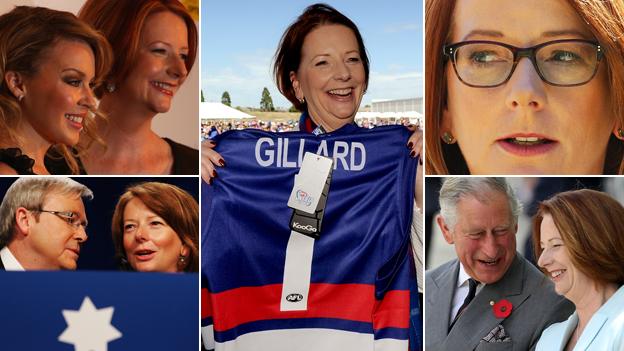What Julia Gillard did for Australia and sexism
- Published

In the end, Julia Gillard is likely to be remembered more for the manner of her coming, the manner of her going and her gender, than for what she achieved during her three years as Australia's prime minister.
That will be a shame for a leader who guided 532 pieces of legislation through a hung parliament, including some major social and environmental reforms.
But for better or for worse, it will be an accurate reflection of how her premiership was perceived in Australia at the time.
Julia Gillard was then-Prime Minister Kevin Rudd's deputy when, to stem the wound of Labor's plummeting popularity, she deposed him in a surprise coup in June 2010.
'Knifed a mate'
The irony that he too had been given the boot, before being allowed to serve out his term as Australia's elected leader, has not been lost on the many Gillard detractors.
Despite Australia's long history of political coups, that event set the idea that Julia, as she is frequently referred to in Australia, had knifed a mate.
There are many narratives about what finally led to her downfall.
All have elements of truth and which one you believe most depends on which tribe you belong to.
To many women, it was the undeniable misogyny and sexist scrutiny she endured throughout her leadership that brought her down.
Sexist and personal attacks
"Deliberately barren", "bitch" and "witch" were all phrases thrown around, sometimes by opposition MPs.
One of Australia's most listened-to radio commentators suggested, weeks after her beloved father passed away, that he had "died of shame".
Another radio "shock-jock" asked her if her partner was gay.
He lost his job. The first commentator is still on air.
A Liberal party supporter penned a mock menu for a fundraiser which promised to serve up "Julia Gillard Kentucky Fried Quail -Small Breasts, Huge Thighs and a Big Red Box".
Even feminist Germaine Greer once said the PM's "arse was fat".
Many Australians rightly say that no male politician has ever been subjected to such continued, personal attacks.
But that is not the whole story.
Bad PR
Even her supporters agree that her government was gifted at shooting itself in the foot.
The opposition's strategy of hammering home Labor's U-turns was made easy by two big policy flips: the carbon tax and the promise of a budget surplus.
It imposed the first when it said it would not and did not manage the second when it repeatedly said it would.
Tony Abbott: 2, Julia Gillard: 0.
Labor under Gillard was also perplexingly bad at letting the electorate know about its achievements - a revolutionary national insurance system for the disabled, a much-needed plan to save a key Australian river system, tax reform, education reform.
They all seem to have been somehow overshadowed and not just by powerful negative messaging from the opposition.
On the day she was delivering an historic apology to victims of forced adoptions, she was subjected to a phantom leadership challenge by her own party.
Instead of a powerful message of a government righting wrongs, the electorate got a vision of a party in disarray and this was the image it carried home.
'On the verge of a crash'
Australia is nearly unique in Western democracies for the way it has survived the global financial crisis. Unemployment is low, debt to GDP ratio is comparatively low and its citizens enjoy a remarkable standard of living.
But this is not the message that Australians have absorbed.
Instead it is one of a country on the verge of a crash, with unacceptably high debt and precarious finances.
This is partially down to a media that seems to be particularly adept at looking for the gloom, but must also be down to a government that never found a way to explain to Australians how well they have endured the crisis.
Julia Gillard said that leadership of the party and of the country had been "a privilege" and she thanked the Australian public for their support.
Julia Gillard herself was not the best communicator. Even her friends acknowledge she needed to show more of the passion and warmth that was there but was so often kept in reserve.
Feud
But really what did for Julia was Kevin Rudd himself - the man she had toppled, who never let go of his dream of getting back into the top job.
Once he challenged and failed. Another time his supporters called for him to challenge and he did not.
The third time he rose again, after spending months courting the media in carefully scripted moments that were officially about campaigning for Labor, but were really about reminding voters he was still there, waiting in the wings, should they want him.
Polls show Labor is likely to do much better in the coming election under Kevin Rudd than Julia Gillard and the caucus finally decided to risk seeming like a fickle rabble rather than face a thrashing under a maligned leader.
Hillary Clinton famously said, when she lost out on the US Democratic party's presidential nomination, that she had not shattered her country's "highest and hardest" glass ceiling, but there were now 18 million cracks in it.
The lesson we might take from Julia Gillard's career is that shattering Australia's glass ceiling resulted in walking on a lot of broken shards.
- Published6 June 2013
- Published27 June 2013
- Published13 November 2013